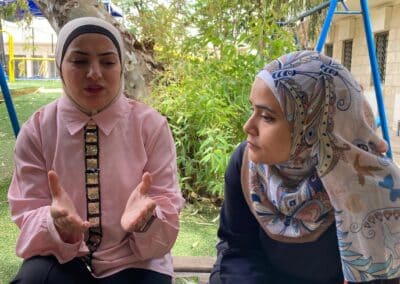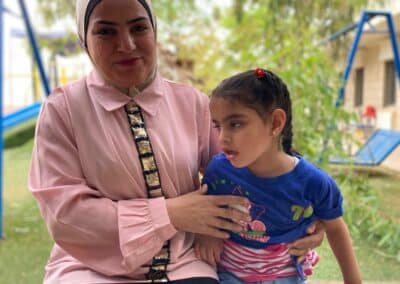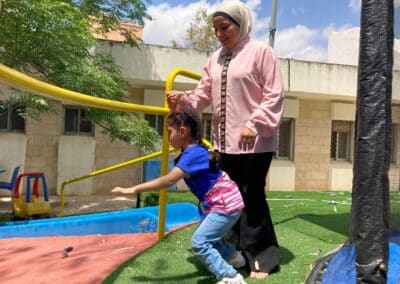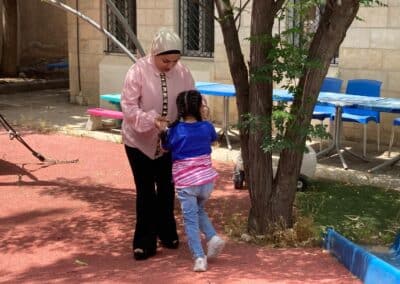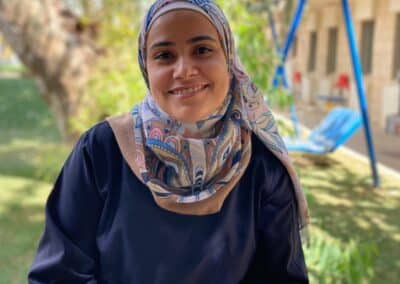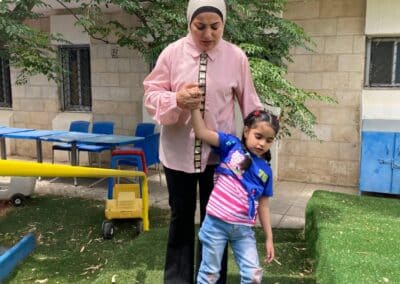This May concludes a project that we have developed in Amman (Jordan) to provide comprehensive rehabilitation services to boys and girls with functional diversity, also supporting their families and caregivers.
With the collaboration of our local partner, Al Hussein Society (AHS), and the financial support of the Fondazione Terzo Pilastro, we have worked to provide quality pediatric and dental care to these children at the AHS facilities.
Jena’s story
Jena Al-Hassena is 5 and a half years old and has been one of the participants in that initiative. Her mother, Suzan Al-Hassenan, says that, before the Project, they lived in a situation of total precariousness when it came to treating her daughter’s disability. Furthermore, she recognizes that, although she could have found another center, she could not have assumed the financial cost: “In Jordan it is almost impossible to find a specialized center that offers all the services that AHS provides at no cost,” explains Suzan.
Additionally, Suzan recalls unpleasant experiences when trying to treat her daughter’s disability in other centers. “They imply that since your daughter has a disability, she shouldn’t be treated like just another child, and that hurts a lot,” she says.
For this reason, she feels very grateful for the opportunity of participating in this initiative: “I was very lucky because, after carrying out the relevant needs assessment, it was confirmed that my daughter and I met all the necessary requirements to be part of the Project promoted by the Social Promotion Foundation and AHS.”
In this sense, Suzan also praises the work and professionalism of the AHS staff, who work together and in coordination to offer quality care to these children and their families. “I realized that, really, AHS could be the only possible alternative to treat my daughter’s case in a comprehensive way, working not only on aspects related to the motor system,” she explains. And this Center has cutting-edge technological tools to treat, for example, the cognitive stimulation of these patients and a swimming pool equipped to stimulate the muscles of boys and girls who require it.
Since they began their participation in the project, Suzan says with joy that “my daughter now wakes up happy, and when we approach the Center and she identifies where I am taking her, she begins to smile. She likes it a lot, she has a good time, she enjoys and has fun. Even though she can’t speak, you can see in her face that she loves to come.”
Receiving these comprehensive rehabilitation services to treat Jena’s disability has also allowed the little girl to begin to show some very notable progress. “Until a few weeks ago, my daughter was not able to get up from the ground and walk a few steps by herself. Now she does it, with the support of an adult, but she knows that she is capable,” says her mother. “She has gained not only her abilities, but also her self-confidence, since, I am sure, she is aware of these advances. Plus, she sleeps better and is calmer.”
Thanks to this opportunity, Suzan faces the future of her family and her daughter with hope and confidence: “We are all calmer knowing that Jena receives personalized attention at AHS. We know that she has a very large room for improvement if she continues to access these comprehensive services in the coming months and years. If she is fine, everyone in the family is fine too.”
Mai’s professional and personal experience
Mai Al-Ramahi is a physiotherapist and has been the coordinator of the early care team in this project. She began working at AHS more than 11 years ago, shortly after finishing college.
She confesses that she loves her job and that she is very lucky to work with her friends and colleagues in her degree. “No one has a team of technical and professional resources like the one I have, I assure you,” she says proudly.
Regarding the Project, she explains that it was designed based on very precise needs assessments and understanding that the cases of these boys and girls required the application of a comprehensive methodology.
In this sense, she emphasizes that “it has been a wonderful experience, since we have achieved very important progress in many cases. Both personally and professionally it has been very rewarding.”
Furthermore, she adds that thanks to this initiative she has confirmed that perseverance also pays off when working with children with functional diversity. “Physical and cognitive deficiencies can be treated through constant exercise and stimulation, and this is how results are achieved that may have seemed impossible at first,”she explains.
From a personal point of view, Mai has also seen with satisfaction how the fathers and mothers of these patients “are left speechless when they see the progress that their sons and daughters make as the sessions progress. It’s very exciting”.






